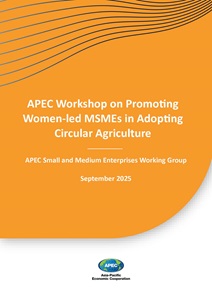
Reports
APEC Regional Trends Analysis, October 2025
The Asia-Pacific Economic Cooperation (APEC) is a regional economic forum established in 1989 to leverage the growing interdependence of the Asia-Pacific.
The Asia-Pacific Economic Cooperation (APEC) is a regional economic forum established in 1989 to leverage the growing interdependence of the Asia-Pacific.
APEC ensures that goods, services, investment and people move easily across borders. Members facilitate this trade through faster customs procedures at borders; more favorable business climates behind the border; and aligning regulations and standards across the region.
APEC ensures that goods, services, investment and people move easily across borders. Members facilitate this trade through faster customs procedures at borders; more favorable business climates behind the border; and aligning regulations and standards across the region.
APEC works to help all residents of the Asia-Pacific participate in the growing economy.
APEC works to help all residents of the Asia-Pacific participate in the growing economy.
Capacity building projects play an important role in helping translate APEC's goals into reality.
Capacity building projects play an important role in helping translate APEC's goals into reality.

Proceedings
•September 2025
Download Report
1MB
Published Under
SOM Steering Committee on Economic and Technical Cooperation (SCE), Small and Medium Enterprises Working Group (SMEWG)
Accessed
348
Pages
29
The APEC Workshop on Promoting Women-led MSMEs in Adopting Circular Agriculture aims to promoting capacity building for MSMEs in agriculture to adopt CBM through sharing knowledge, experiences and practices from speakers, experts, and participants from the APEC member economies. From the sharing, they came up with a number of highlights and recommendations that are beneficial to promote circular agriculture such as promoting access to finance green loans and grants to facilitate their adoption of circular economy models; promoting gender-responsive land policies; enhancing circular economy capacity through enhancing carbon management; promoting collaborative partnerships, including but not limited to promoting multi-stakeholders, institutional collaboration, R&D investment, models such as cooperatives alliance; promoting digital platforms for digital skills/traceability/biotech as well as harness women-led MSMEs to take advantages of e-commerce to enhance access to markets, strengthening market linkages for sustainable products; fostering green trade initiatives and common eco-certification within APEC; supporting technology and technical cooperation in APEC (e.g.: APEC green technology sharing platform); empower women entrepreneurs through promoting funding or incubation for tech ventures); promoting capacity building for APEC member economies through providing training/workshop/seminars, etc., to support women entrepreneurs in practicing circular agriculture; and so on.

